-
 Bitcoin
Bitcoin $84,140.6204
-0.65% -
 Ethereum
Ethereum $1,571.7107
-1.08% -
 Tether USDt
Tether USDt $0.9999
-0.01% -
 XRP
XRP $2.0657
-1.57% -
 BNB
BNB $587.0749
0.63% -
 Solana
Solana $131.5042
2.64% -
 USDC
USDC $0.9999
0.00% -
 TRON
TRON $0.2477
-2.84% -
 Dogecoin
Dogecoin $0.1541
-0.47% -
 Cardano
Cardano $0.6147
0.44% -
 UNUS SED LEO
UNUS SED LEO $9.0845
-3.46% -
 Chainlink
Chainlink $12.3082
-0.44% -
 Avalanche
Avalanche $18.9724
-0.49% -
 Toncoin
Toncoin $2.9419
1.59% -
 Stellar
Stellar $0.2373
-0.06% -
 Shiba Inu
Shiba Inu $0.0...01167
-1.19% -
 Sui
Sui $2.0762
-1.59% -
 Hedera
Hedera $0.1594
0.08% -
 Bitcoin Cash
Bitcoin Cash $329.6626
2.63% -
 Polkadot
Polkadot $3.5903
0.80% -
 Litecoin
Litecoin $74.4026
-0.45% -
 Hyperliquid
Hyperliquid $16.1660
1.52% -
 Dai
Dai $1.0000
-0.01% -
 Bitget Token
Bitget Token $4.3245
-0.26% -
 Ethena USDe
Ethena USDe $0.9991
-0.01% -
 Pi
Pi $0.6112
-1.00% -
 Monero
Monero $215.3188
-1.23% -
 Uniswap
Uniswap $5.1249
-1.18% -
 OKB
OKB $50.3147
-2.91% -
 Pepe
Pepe $0.0...07131
-0.66%
What is DeFi? How does it change traditional finance?
DeFi, using blockchain, offers decentralized financial services, cutting out intermediaries for lower fees and greater accessibility via smart contracts. However, security, regulation, and user experience remain significant challenges.
Mar 03, 2025 at 06:18 pm
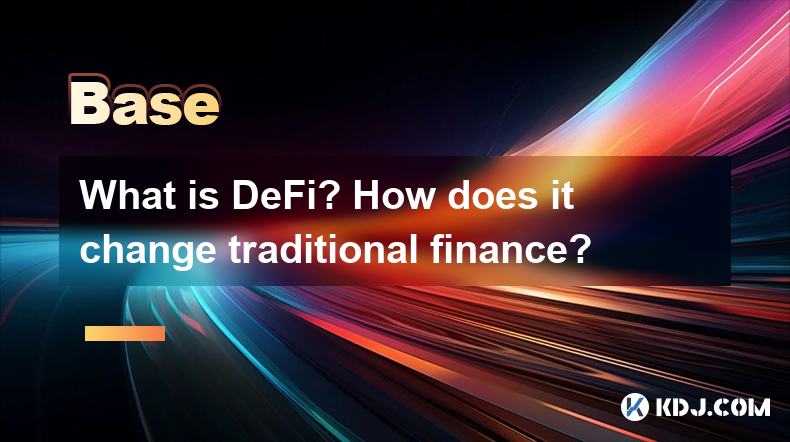
Key Points:
- DeFi, or Decentralized Finance, leverages blockchain technology to recreate traditional financial services in a trustless and transparent manner.
- It eliminates intermediaries like banks and brokers, leading to potentially lower fees and increased accessibility.
- DeFi's core functionality relies on smart contracts, automated programs that execute agreements without human intervention.
- While offering innovative solutions, DeFi also presents challenges regarding security, regulation, and user experience.
- The impact on traditional finance is multifaceted, potentially disrupting existing models while also creating new opportunities for collaboration.
What is DeFi?
DeFi, short for Decentralized Finance, is a rapidly evolving ecosystem built on blockchain technology. Unlike traditional finance (TradFi), which relies on centralized institutions like banks and brokerage firms, DeFi operates on a decentralized, permissionless network. This means transactions are processed without the need for intermediaries, increasing transparency and potentially reducing costs. The core of DeFi lies in its utilization of smart contracts – self-executing contracts with the terms of the agreement directly written into code. These smart contracts automate various financial processes, enhancing efficiency and security.
How DeFi Uses Blockchain Technology
Blockchain's inherent features – immutability, transparency, and security – are crucial to DeFi's functionality. The distributed ledger ensures that all transactions are recorded and verified across the network, preventing fraud and manipulation. This transparency allows anyone to view the transactions on the blockchain, promoting accountability and trust. The security is derived from cryptographic principles, making it extremely difficult to alter or tamper with the data on the blockchain. This forms the bedrock of trust in the decentralized system.
Key DeFi Applications
DeFi offers a wide range of financial services, mirroring and often extending the capabilities of TradFi. Some prominent examples include:
- Decentralized Exchanges (DEXs): These platforms allow users to trade cryptocurrencies directly with each other without relying on centralized exchanges.
- Lending and Borrowing Platforms: Users can lend or borrow crypto assets, earning interest on their deposits or accessing funds at competitive rates.
- Stablecoins: These cryptocurrencies are pegged to a stable asset like the US dollar, mitigating the volatility inherent in many cryptocurrencies.
- Yield Farming: Users can deposit their crypto assets into liquidity pools to earn rewards, essentially providing liquidity to the DeFi ecosystem.
- Decentralized Autonomous Organizations (DAOs): These community-governed organizations use smart contracts to manage funds and make decisions collectively.
How DeFi Changes Traditional Finance
DeFi's decentralized nature fundamentally challenges the traditional financial system. By removing intermediaries, it has the potential to:
- Reduce transaction costs: Eliminating banks and brokers can significantly lower fees associated with financial transactions.
- Increase accessibility: Anyone with an internet connection can access DeFi services, regardless of their location or financial background.
- Enhance transparency: All transactions are recorded on a public blockchain, making the system more transparent and accountable.
- Promote financial inclusion: DeFi can provide financial services to underserved populations who lack access to traditional banking systems.
Challenges and Risks of DeFi
Despite its potential benefits, DeFi also faces significant challenges:
- Security risks: Smart contracts can be vulnerable to exploits and bugs, potentially leading to significant financial losses.
- Regulatory uncertainty: The regulatory landscape for DeFi is still evolving, creating uncertainty for users and developers.
- Complexity and user experience: DeFi protocols can be complex and difficult for non-technical users to navigate.
- Scalability issues: Some DeFi platforms struggle to handle a large volume of transactions, leading to slow processing times and high fees.
- Oracle manipulation: DeFi applications often rely on oracles to provide real-world data, which can be manipulated.
The Future of DeFi and its Interaction with TradFi
The future of DeFi is uncertain, but its impact on traditional finance is likely to be significant. Some believe DeFi will eventually replace traditional financial institutions, while others predict a more collaborative future where TradFi and DeFi coexist and even integrate. The ongoing development and adoption of DeFi will shape the future of finance.
Frequently Asked Questions:
Q: Is DeFi safe?
A: While DeFi offers many benefits, it is crucial to understand that it carries inherent risks. Smart contract vulnerabilities, exploits, and scams are all potential threats. Users should thoroughly research projects and platforms before engaging with them.
Q: How can I get started with DeFi?
A: Getting started with DeFi requires some technical knowledge and understanding of cryptocurrencies. You'll need a cryptocurrency wallet and to learn how to interact with different DeFi protocols. Start with smaller amounts to mitigate risk.
Q: What are the benefits of using DeFi over traditional finance?
A: DeFi offers potentially lower fees, increased accessibility, greater transparency, and potentially faster transaction speeds. However, it also carries higher risks.
Q: Is DeFi regulated?
A: The regulatory landscape for DeFi is still largely undefined and varies across jurisdictions. Many regulatory bodies are currently exploring how to best regulate this rapidly evolving space.
Q: What is the difference between CeFi and DeFi?
A: CeFi (Centralized Finance) refers to traditional financial services provided by centralized institutions like banks, while DeFi (Decentralized Finance) leverages blockchain technology to provide similar services in a decentralized manner.
Disclaimer:info@kdj.com
The information provided is not trading advice. kdj.com does not assume any responsibility for any investments made based on the information provided in this article. Cryptocurrencies are highly volatile and it is highly recommended that you invest with caution after thorough research!
If you believe that the content used on this website infringes your copyright, please contact us immediately (info@kdj.com) and we will delete it promptly.
- Kaspa (KAS) Price Prediction Hints at Accumulation Before Potential Surge
- 2025-04-17 22:15:13
- FET Price Prediction: Artificial Superintelligence Alliance (FET) Cryptocurrency Rebounds 10%
- 2025-04-17 22:15:13
- U.S. President Donald Trump Slammed Fed Chair Jerome Powell
- 2025-04-17 22:15:12
- Running a laundromat can't be as "easy" as potential investors may believe it is
- 2025-04-17 22:15:12
- BlockDAG (BDAG) Presale Explosion and Mobile Mining Powerhouse
- 2025-04-17 22:05:12
- Solana (SOL) Price Prediction: Eyes on $180 as Structure Turns Bullish
- 2025-04-17 22:05:12
Related knowledge
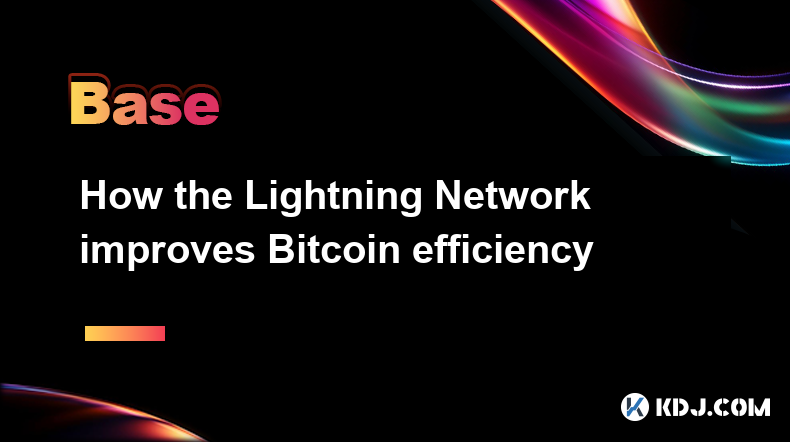
How the Lightning Network improves Bitcoin efficiency
Apr 17,2025 at 08:56pm
The Lightning Network represents a significant advancement in the Bitcoin ecosystem, aiming to address some of the most pressing issues related to transaction speed and cost. By enabling off-chain transactions, the Lightning Network drastically improves Bitcoin's efficiency, allowing for faster and cheaper transactions. This article will explore how the...

Analysis of the KYC process of cryptocurrency exchanges
Apr 17,2025 at 05:07pm
The Know Your Customer (KYC) process is a critical component in the operations of cryptocurrency exchanges. It serves as a regulatory measure to prevent fraud, money laundering, and other illicit activities. KYC procedures are designed to verify the identity of users and ensure compliance with financial regulations. This article delves into the various ...

What does Floor Price mean in the NFT market
Apr 17,2025 at 12:42am
The term Floor Price is a critical concept within the NFT (Non-Fungible Token) market, serving as a key indicator for both buyers and sellers. In essence, the floor price represents the lowest price at which an NFT from a particular collection is currently listed for sale on a marketplace. This price point is crucial for understanding the perceived valu...
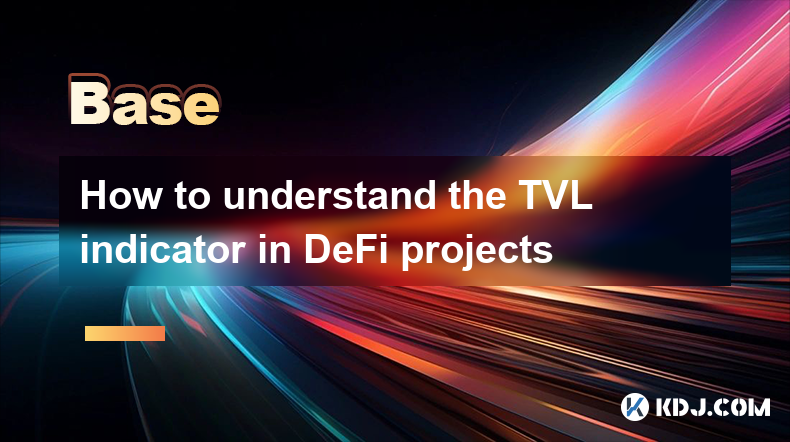
How to understand the TVL indicator in DeFi projects
Apr 17,2025 at 03:28pm
Understanding the TVL indicator in DeFi projects is crucial for investors and enthusiasts looking to gauge the health and popularity of decentralized finance platforms. TVL, or Total Value Locked, represents the total amount of assets that are currently staked or locked in a DeFi protocol. This metric serves as a barometer for the trust and interest tha...
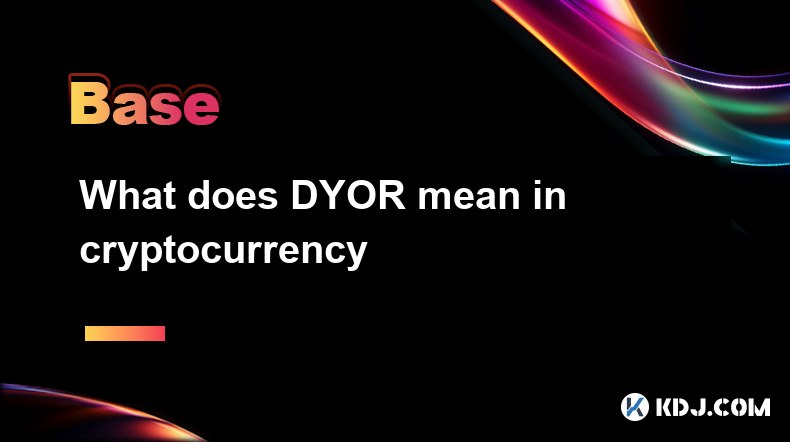
What does DYOR mean in cryptocurrency
Apr 17,2025 at 03:00pm
DYOR, or 'Do Your Own Research,' is a crucial mantra in the cryptocurrency community. It emphasizes the importance of individuals conducting their own thorough investigations before making any investment decisions. In the fast-paced and often volatile world of cryptocurrencies, relying solely on others' advice or the hype surrounding a particular coin c...
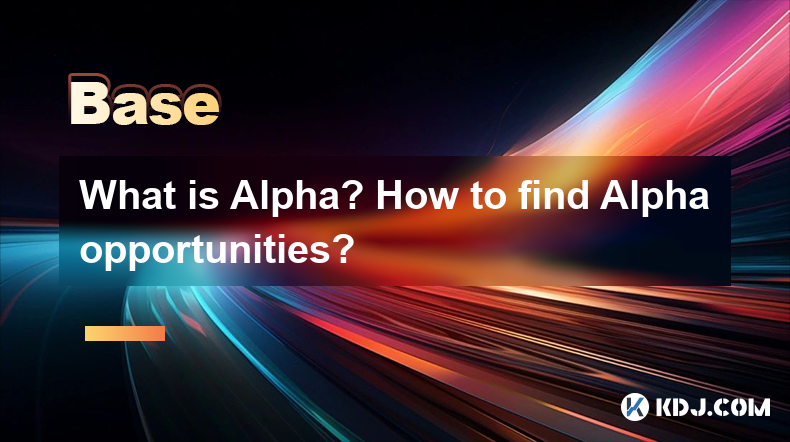
What is Alpha? How to find Alpha opportunities?
Apr 16,2025 at 12:42pm
What is Alpha?Alpha is a term widely used in the financial world, including the cryptocurrency market, to describe the ability of an investment to outperform a benchmark. In the context of cryptocurrencies, alpha refers to the excess return an investor achieves over the market's average return. For example, if the overall crypto market grows by 10% in a...

How the Lightning Network improves Bitcoin efficiency
Apr 17,2025 at 08:56pm
The Lightning Network represents a significant advancement in the Bitcoin ecosystem, aiming to address some of the most pressing issues related to transaction speed and cost. By enabling off-chain transactions, the Lightning Network drastically improves Bitcoin's efficiency, allowing for faster and cheaper transactions. This article will explore how the...

Analysis of the KYC process of cryptocurrency exchanges
Apr 17,2025 at 05:07pm
The Know Your Customer (KYC) process is a critical component in the operations of cryptocurrency exchanges. It serves as a regulatory measure to prevent fraud, money laundering, and other illicit activities. KYC procedures are designed to verify the identity of users and ensure compliance with financial regulations. This article delves into the various ...

What does Floor Price mean in the NFT market
Apr 17,2025 at 12:42am
The term Floor Price is a critical concept within the NFT (Non-Fungible Token) market, serving as a key indicator for both buyers and sellers. In essence, the floor price represents the lowest price at which an NFT from a particular collection is currently listed for sale on a marketplace. This price point is crucial for understanding the perceived valu...

How to understand the TVL indicator in DeFi projects
Apr 17,2025 at 03:28pm
Understanding the TVL indicator in DeFi projects is crucial for investors and enthusiasts looking to gauge the health and popularity of decentralized finance platforms. TVL, or Total Value Locked, represents the total amount of assets that are currently staked or locked in a DeFi protocol. This metric serves as a barometer for the trust and interest tha...

What does DYOR mean in cryptocurrency
Apr 17,2025 at 03:00pm
DYOR, or 'Do Your Own Research,' is a crucial mantra in the cryptocurrency community. It emphasizes the importance of individuals conducting their own thorough investigations before making any investment decisions. In the fast-paced and often volatile world of cryptocurrencies, relying solely on others' advice or the hype surrounding a particular coin c...

What is Alpha? How to find Alpha opportunities?
Apr 16,2025 at 12:42pm
What is Alpha?Alpha is a term widely used in the financial world, including the cryptocurrency market, to describe the ability of an investment to outperform a benchmark. In the context of cryptocurrencies, alpha refers to the excess return an investor achieves over the market's average return. For example, if the overall crypto market grows by 10% in a...
See all articles























































































